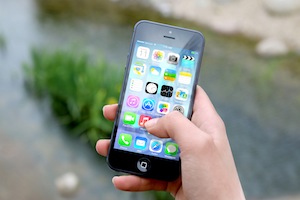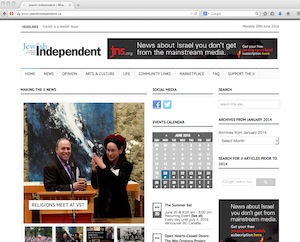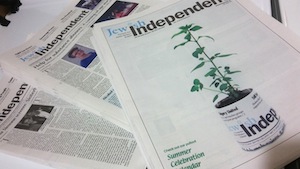A concert at Deer Lake Park gets Matty Flader thinking about social media. (photo from deerlakepark.org)
King David High School’s creative writing course, taught by Aron Rosenberg, partnered with the Jewish Independent for their final unit of the school year. Students were challenged to write articles reflecting on their identity as young Vancouverites in the Jewish community. After brainstorming topics, the students agreed to focus an article on technology or print media, and how these things are changing and will continue to transform in the future. Here are some of their thoughts.
Phone-y confidence
by Matty Flader
Last night, I went to a concert in Deer Lake Park, an outdoor venue, with my sister. We went to see the Lumineers, a folk band that has become fairly popular since their debut album in 2013. I was rather excited to see the show, as I am a big fan of the band’s music and unique style.
It rained throughout the concert, which was a major annoyance. Getting soaked and standing in the mud for a few hours is not everyone’s ideal evening, but it was worth it for the music. The band was excellent at performing live and it was an amazing show. One thing that almost did ruin my experience, however, was the sea of cellphones raised above people’s heads filming the concert. Almost everyone at some point had their phones out to film the concert to share with their friends over social media.
One thing I think our parents do not understand about our generation is that social media is a competition. We constantly compete by sharing statuses, photos and videos of anything significant we do. The goal is simple acknowledgement or validation from our peers; we want them to be jealous of how amazing our lives are. The most famous of our friends – the one with the most likes and shares – is the most successful among us, though we wouldn’t admit that aloud. Our generation lives in constant fear of being forgotten or ignored, and we use social media as a way to remind our friends of how exciting we are.
It is no longer innate to live in the moment. Now that everything is expected to be documented, we live our best moments through the small screens of our phones. Concerts are just the tip of the iceberg. I have encountered this issue at graduations, parties, hanging out with friends, and even spending time with one’s parents. Although I love modern technology, sometimes I wish I could exist without the ominous anxiety of social media.
Technology today
by Eli Friedland
We live in a world where technology is the new alcohol. Rather than face reality, people stare at their screens, lost in the lives of others. Picture perfect images captured for eternity. Model-worthy smiles lighting up the screen. Are they real? That is the question most people fail to ask themselves when they zealously peruse the photos that flood their news feeds.

We live in a world where, rather than make conversation with those in front of us, we choose to talk to an online persona. We have closed the gap from those distant to us, yet we have distanced the gap from those closest to us. We ride the bus in silence, the only sound, fingers tapping away at screens. We receive validation from ambiguous “likes” and take pride in meaningless comments. We allow the world to pass us by as we scroll through the news in far off lands. We only see the perfect that happens to others, that which is posted online. Tired eyes scroll through vast oceans of pictures that have no end.
Constant alertness and comparisons are our 10 plagues. We need redemption from technology. I cannot bear to imagine a world in which people cannot talk, for technology has robbed us of our voices. I fear this more than anything and I know that G-d gave us a day of rest to prevent this plague from growing too large.
Every Friday at sundown, I power down. I turn my phone off, I put my laptop away and I put all electronics out of sight and out of mind. All week, I long for Friday, when I have a valid excuse to disconnect from technology. Rather than staring anxiously at my smartphone, I make myself smart. I read books, I learn from my family, friends and the rabbi’s lectures. I spend all week learning hacks for my phone but, come the weekend, I learn about people. Instead of awaiting a text or phone call that might never come, I knock on my friends’ doors and we go to the park, we walk, we talk. I play Bananagrams with my parents, I soak up the sun with my brother, I interact with humanity in a way unparalleled when phones are out. On the Jewish day of rest, I receive people’s undivided attention and they receive mine.
Death of print media
by Noah Hayes
In Canada, print media’s roots go back to the Halifax Gazette, started in 1752. Since then, print media has reigned as the dominant form of news media all over the world. But it’s no secret that digital streams of information are pushing aside the morning paper. The reality is that your kids will likely wake up in the morning and go on their electronic devices to see the latest happenings, rather than wake up to a freshly printed newspaper, waiting to be read and, eventually, discarded.
As a high school student who values media but rarely in print, I am often confronted with the question of why we don’t really need print media anymore. If you need a plumber, a painter, a lawyer or a car, you’re likely not looking in your newspaper these days. It’s not like word of mouth is a modern concept but, with the internet as a platform to share recommendations and spread ideas, newspaper advertisements are less relevant.

Some may suggest that print ads – and not just in newspapers – can be more effective because they target specific geographic regions or interest groups. For instance, if I know of a wealthier area in the city that has lots of nice cars and is mostly made up of younger people, I can advertise a more expensive car that younger people would be more interested in on a bus stop, or even on the side of a bus that goes through there. In a rougher area of the city, I can advertise an entry-level car because more people might be willing to buy it.
What’s becoming more and more the reality, however, is that the internet can do the same thing, with even greater accuracy and efficiency; data tracking in this day and age is limitless. If you’ve been searching for a new pair of shoes on a website, ads for that website can appear on the next site you’re on, even if it’s totally unrelated to shoes. You’re being tracked on most sites that you go on. It’s 2016 and, even with Edward Snowden’s notoriety, people are still unaware of the trail they create just by going on their computer. And this trail is analyzed for more than just advertising.
What about entertainment? Many read print media to stay up to date or see an interesting piece from their favorite columnist in the morning. These newspapers or magazines now almost always have websites where you can also read your favorite columnists. If you go on Twitter, you can get live updates from your favorite journalist or news source, along with a link to articles they publish. Your dearest sports team probably has a website, along with sites dedicated to covering it, and their beat writer likely has a sturdy online presence, too. If you just want a gob of information to delve into, try going on Reddit or Buzzfeed. Some sites go well beyond the impersonal newspaper and literally let you customize your own homepage to only get info on the things you’re interested in. Want pictures? Check. Want funny pictures? Check. Want funny pictures of cats doing awkward, cute poses? Check.
The biggest reason why people seem to be migrating away from print media towards the internet is cost. Though newspaper and magazine companies can still charge you for reading their websites, most digital media is free. For these companies, why produce a print version if they’re also going to put their content online? Perhaps the sense of familiarity and comfort that comes with print media is its most effective selling point. The digital world hasn’t hit its peak yet because the older generation still values the routine and ritual of the morning paper or magazines.
As morbid as it sounds, the only part of print media that doesn’t seem easily replaceable is the “In Memoriam” section of the newspaper. There are few ways to find out about lost loved ones in the community, or the anniversaries of their passing. However, the community of the internet is much larger than the local communities that find solace in the local newspaper’s “In Memoriam” section and, one day, the internet will provide this service, too.
Digital media is simply too powerful. It’s a tool that can be used in dozens of different ways, an unstoppable machine that will eventually show print media the door, and make sure that door hits its tuchus on the way out.
Print’s ironic future
by Leora Schertzer
Every day, more than two million news articles are published online. Millennials subscribe to a fast-paced lifestyle, making the internet a popular platform to read the news mere minutes after the fact. People share news and magazine articles with their friends and followers over Facebook, Snapchat, Twitter and beyond. If you were to ask the average young adult where she or he reads about the latest happenings, the answer would most likely be through the shared articles of her or his online peers. Perhaps a more cultured individual would name a specific news source that she or he frequents to maintain a sharp awareness of the world, which would also be online.

Though the future of print media seems dire, I would argue that not all hope is lost. Many people still prefer paper copies of newspapers, magazines and books. Some claim that a good old physical copy feels more personal and less distracting. With access to literally millions of other articles online, users could feel rushed or anxious, knowing that there are so many more articles to be read. A real newspaper feels like your own and, with one’s options limited to one paper, consumers could feel satisfied with the articles they have read, rather than feeling they have merely grazed the tip of the iceberg of daily news.
Another reason print media may live on is for the sake of esthetic and irony, similarly to vinyl records. People still love their vinyl record collections, even though far more practical and efficient ways of listening to music are out there. Some may hang on to print newspapers and magazines for the novelty, or because they believe the “original way” is the “best way.” For this reason, print media may make a comeback within the next 40 years. Though print media will become more of a niche market in the near future, as it becomes less common or mainstream, it may ironically become more highly regarded – what becomes less viable, becomes more valuable.

